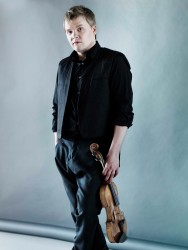 United Kingdom Bartók, Biber, Crumb, Haydn, Messaien, and Ravel: Pekka Kuusisto (violinist/conductor), Scottish Chamber Orchestra, City Halls, Glasgow, 22.3.2019. (GT)
United Kingdom Bartók, Biber, Crumb, Haydn, Messaien, and Ravel: Pekka Kuusisto (violinist/conductor), Scottish Chamber Orchestra, City Halls, Glasgow, 22.3.2019. (GT)

Bartók – Katonanóta (Soldiers’ Song from 44 Duos)
Ravel – Prélude, Forlane, Menuet & Rigaudon from Le Tombeau de Couperin; Allegro from Sonata for Violin and Cello
Messaien – Abime des Oiseaux from Quatuor pour la fin du Temps
Crumb – God-Music from Black Angels
Biber – Battalia
Haydn – Symphony No.45 in F-sharp minor ‘Farewell’
This concert following the theme of War and the Ages served as another vivid demonstration of the eclectic programming by this ensemble in recent years. The programme brought together music marking the consequences of war fought over the ages by composers – born 500 years apart – from France, America, Hungary and Austria. The appearance of the brilliant Finnish violinist Pekka Kuusisto underscores why the Scottish Chamber Orchestra have appointed him as their Featured Artist next season.
The concert started with a brief duet between Kuusisto and Benjamin Marquise Gilmore playing stoically an austere and rather barren melody by Bartók drawn from a folk tune, yet this proved a subtle opening, for it was immediately followed by the Prélude from Ravel’s Tombeau du Couperin in which the clarinet of Maximiliano Martin was spectacularly brilliant and wonderfully backed by nimble strings offering a welcome burst of sunshine with their colourful harmony. Dividing the four parts of Ravel’s orchestral piece was an interesting idea for the Allegro from Ravel’s Sonata for Violin and Cello followed; the playing swaying between Kuusisto and Philip Higham offered hints of the quartet with pleasantly elaborate ideas. In the Forlane from Tombeau de Couperin, we heard the brightness of springtime, especially fine on the flute of Joanna Shaw, Robin Williams on oboe and Martin on clarinet. The most astonishing playing of the evening came from Martin’s clarinet as the soloist in Abime des Oiseaux from Messiaen’s quartet. This was a stunning example of world-class playing sounding soulful – albeit droning and dirge-like – with its sudden bird incantations. The Menuet of Ravel’s dedication to Couperin seemed as if life goes on revealing corresponding modernism with neo-classicism in its grace, bright harmony and tunefulness. The brief extract from George Crumb’s quartet – composed against the backdrop of the Vietnam war – was performed by two musicians bowing against glasses of water offering dissonance against the plaintive threnody from the strings, with the lamenting idea plunging eventually into nothingness. Suddenly, the Rigaudon from Tombeau du Couperin brought us into a new world with its burst of joyous upbeat sound and life assertiveness.
The Biber piece was briskly played by a nonet of string players and accompanied by harpsichord and the work is in six brief movements, interrupted by foot tapping and noisy off-stage laughing and rustic merry-making. The strings group with Jan Waterfield at the harpsichord was led masterfully by Kuusisto and proved – not without echoes of Vivaldi – greatly entertaining in its vibrancy and earthiness.
An unexpected piece in between the Battalia, and the final work, was Kuusisto playing an entertaining medley of Scottish reels as the stage was rearranged. Haydn’s ‘Farewell’ Symphony opened briskly, and with lively, suspenseful playing. The Adagio was whimsical, perfunctory and elegiac with sporadic sighs of beauty; in the Menuet, brightness and sobriety were prominent. The Finale was merry and bright with the secondary upbeat idea, and slowly in the concluding Adagio, the musicians departed one by one, to leave Kuusisto and the second violinist embracing on stage.
This was a marvellous evening and one looks forward to next season’s collaborations with this outstanding musician when he will back again for three scheduled concerts with the SCO.
Gregor Tassie
